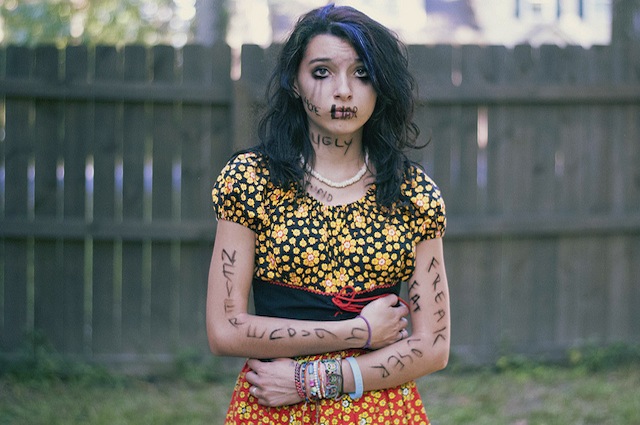
“The place to improve the world is first in one’s own heart and head and hands.” ~Robert M. Pirsig
Many of us are exploring what it means to be responsible for ourselves, to be creating our own reality. These are concepts that in some situations are easy to grab ahold of; at other times, the meanings are far more elusive.
I’ve seen, in myself and in others, the tendency to beat ourselves up while we are learning what self-empowerment really means. I think this is a natural result of our cultural programming, and it’s understandable that we’d need to work through this type of self-punishment on our quest for understanding.
I used to be an expert at self-blame.
When old relationships ended, I asked myself what I’d done wrong. When I didn’t take advantage an opportunity, I wondered what was wrong with me; why wasn’t I paying more attention? If a friend was acting a bit off, I thought it was me. Had I said something insensitive? Was I talking too much? Was I boring?
I was an excellent over-thinker and a superb finger-pointer, as long as that finger was pointed right back at me.
I rationalized this over-thinking by reminding myself of my desire to be responsible for myself. I was paying attention! I was recognizing my role! I was empowering myself! Doing that required this type of self-questioning!
I knew I was creating my own reality. I felt that if I could not keep things from happening that made me feel uncomfortable (read: sad, mad, confused), then I was failing.
At that time, punishing myself felt like taking responsibility for what was going on. If I blamed myself, it meant I recognized that I was creating the reality. I wasn’t being a victim or pointing the finger at someone else; I was taking on the full load, and man, did I.
I trucked along fairly successfully with that outlook for quite some time. It was certainly stressful, and I spent lots of time making up stories about myself, but it wasn’t affecting me in a negative enough way for me to change it.
That is, until my marriage broke up.
That occurrence marked the beginning of the most stressful time that I’d ever experienced. The internal dialogue was vicious. I felt guilt, and a sense of failure, and a sadness that I’d never experienced before.
That combination of emotions really opened the floodgates to the parts of me that excelled at self-blame.
It was several months into that experience when I realized that all the self-punishment wasn’t helping. I wasn’t feeling any better. If anything, I was feeling worse. The self-blame didn’t feel like healing, or like I was working through the emotion; it felt like quicksand.
Over time, I’ve learned that there is a big difference between being responsible for ourselves and blaming ourselves.
This knowledge didn’t come over night; it was a process that I am still working through. Initially, it can be tough for us to tell the difference between self-punishment and empowerment. Here are a few tips and tricks I’ve used to help me drop the habit of self-blame.
1. Re-frame how you question yourself.
We all have patterns, or tendencies, in how we communicate. In a tough situation, there is probably an automatic question or two that you usually ask yourself. When it pops up, write it down. It might be, “What did I do wrong?” or, “Why do I always eff up?”
Ask yourself if you would ask someone you care about the same exact question. Chances are, the answer is no. Let that sink in.
2. Change the question.
How would you ask the question if it was directed at someone else?
Pretend you are playing the role of trusted friend to someone you respect, love, and whom you hold in the highest regard. Would you have more compassion for their experience? Would you want to be supportive? Would you desire to assist them by being able to offer a more detached view? (Spoiler: Yes!)
The new question you ask will depend on the situation. One that fits almost any experience is, simply, “What can I take from this?”
I also like, “What do I want to learn from this?” which can remind us to consider in a more empowering direction. Also, “How do I want this to be different in the future?” can help us to formulate a plan to make that future happen.
3. Now ask yourself that question.
How does your altered question feel? Does it cause you to clench up, or do you begin hearing a litany of crappy internal dialogue? If so, change the question again. Keep changing it until you come up with a version that you’re comfortable hearing, that assists you in actually coming up with an introspective response.
4. Remember, there is not one “right” way; there are just ways of being.
I think many of us believe there is only one right way or one correct path. With this belief, there are many chances to consider that we are wrong or that we’ve failed. This is simply not the case!
There are many ways to do most tasks, just as there are many ways to live our lives. Having a difficult experience doesn’t mean we’ve done anything wrong; it means we are on a tougher road to learning, for the moment.
Opportunities are infinite; our options are boundless, and we always have the power to change our perspective on any life event, large or small.
We have just as much energy for self-compassion and exploration as we do for self-punishment. It’s up to us to direct it.
How do you shift the energy when you realize you’re beating yourself up?
Photo by Daniela Brown
About Maria Moraca
Maria Moraca is a conscious integrated channeler. She and Zurac (her “entity dude”) work in tandem; Maria encourages empowerment and Zurac offers insight and clarification to life path questions. Her website and blog are at mariachanneling.com.












 Though I run this site, it is not mine. It's ours. It's not about me. It's about us. Your stories and your wisdom are just as meaningful as mine.
Though I run this site, it is not mine. It's ours. It's not about me. It's about us. Your stories and your wisdom are just as meaningful as mine.
I really like the article. I treated myself with negativity almost 100% of the time something went wrong, or just wasn’t the way I wanted it to be. I still do that most of the time, and this article gave me a great technique to change that and improve the relationship with myself. Thank you for that! 🙂
You’re very welcome, so glad you find it helpful! Big hugs!
“There is not one “right” way; there are just ways of being” – I couldn’t agree with you more!
We are way too fixated on “right” and “wrong” that we live our lives out of a constant fear to be “wrong” sometimes…
I used to beat myself up really hard! Especially if something falls from a “picture perfect” that was lovingly created in my mind to be compared with reality.
So when reality looked nothing like that “picture”… I felt terrible, worthless and guilty for not living up to my very own expectations…
But one day something shifted within me. I’ve realised that it’s ok to try and make mistakes.
It’s ok when something doesn’t go according to a plan. I believe that everything happens for a reason… therefore, that reason might take me to a different, better place even if I have no idea where it takes me.
There is no creative use in beating yourself up, feeling dull and guilty! Life is full of surprises and I’ve learned to trust it more and to be anchored in a present moment and just… you know… live… ;-]
Awesome that you created that shift for yourself – I’m guessing life feels much mellower these days! Dropping that “right” or “wrong” thing is huge, and for me an ongoing learning. Thanks for sharing your story here.
Interesting post Maria. I would add one thing. Realizing that there’s a lot that we don’t have control over. I think it’s important to do our best and to treat others well (including ourselves!) but we also need to let go of outcomes and accept that it’s a giant universe out there!
Infinite possibilities abound, and I’m practicing recognizing them! Thanks for your comment Ed 🙂
nicely written Maria loved your article! u know life is full of ups and downs if anything happens its not because of you smetimes it may .you will get a infinite opportunities. 🙂
Everything you say is true, great to remember all the opportunities that are out there – when one door closes, another opens, right?
yea correct!
Thanks for this post. I have been living with a lot of awareness for the last couple of years now and on my journey of reflection and healing. I have been trying to tell myself that I am strong, powerful and courageous. And at last, I had starting taking responsibility for myself. I thought that finally things would start to get better; that I would finally be the person I want to be. And yet I find myself feeling sad, frustrated and confused.
Why can’t I quite seem to be my true self? Why do I still have these voices in my head? Voices that tell me to feel sorry for myself, voices that say I’m weak, voices that tell me there is something wrong with me? Will I every really change? When am I going to feel like myself again? When am I going to be able to just live with the health, happiness and carefree feeling I had before…rather than having to go over details of my day, fighting with myself in my head, wondering if I am ever going to stop feeling like a victim, wondering if I am ever going to get it right?
I will take your suggestion of asking myself –What can I take from this? And I know I need patience… a lot of it.
It’s important to remember we’re always moving forward, even if it feels like we’re not. Voices are just voices – it’s great to begin a practice of telling them to be quiet, because you don’t need their opinion. This helps you take a power position, and begins to shift neurological pathways. If the voices have been consistent, it will take some conscious effort for you to quiet them, but I know you’re up for it 🙂 Much love…
Thank you, Maria 🙂
You’re welcome! 🙂
Intellectually understanding the importance of taking responsibility of the situation is not enough sometimes. The self-sabotaging feeling is really overwhelming and I’m still going through it.. It’s been years.. Still working on it.. In the meantime, what keeps me going are the wonderful, meaningful, in-depth posts such as this.. God bless the souls that impart such wisdom for the betterment of the society!
Definitely still working on it myself, too! Glad this article is helpful!
VERY well articulated advice on how to put the ever-present inner critic in its place!
Thanks for the kind comment Dee!
I think we all have a bit of self-destructiveness within ourselves. It’s but a part of that yin and yang dynamic that can be creative in re-inventing ourselves for the better. The trouble comes if the balance is lost or disrupted.
Thank you so much for this; really needed this today! 🙂
very well explained
I really like the distinction between self responsibility and self blame. There is a big difference. I have been reading from Eric Schleien and he doesn’t put it like this but this helps me see a lot of what he talks about. Like owning up to yourself by recognizing what is going wrong in a situation. And not every situation is your wrong doing.
This really helped me. I have been caught in the self blame game for three months. Love the new questions. Thanks Maria.
What if I cant come up with a question. I have tried for 8 years now. I still consider myself a failure. I have tried everything possible, worked hard all my life, tried to be of use to others/show compassion. But still remain friendless, an outcast, unloved, uncared for, unwanted, alone – living alone – coming back to an empty house day after day after day.
My heart seeks vengeance from those who maimed me as a human and have just glibly moved on citing exactly this “you can choose. You should take responsibility for your life”, and are living happy, successful and content lives with friends and family.
I can neither change my life. Because what I want needs come from the outside world. Nor can I actually destroy these people. I wish I had the power. Either to change my life. Or to destroy them all.
I thought I’d blame myself and hate myself so much after taking responsibility but instead of blaming I think I had just embrace my manhood. It’s liberating.